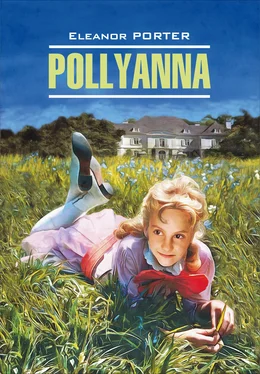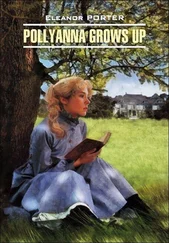“Dr. Chilton, I should think being a doctor would be the very gladdest kind of a business there was.”
The doctor turned in surprise.
“‘Gladdest’! – when I see so much suffering always, everywhere I go?” he cried.
She nodded.
“I know; but you’re HELPING it – don’t you see? – and of course you’re glad to help it! And so that makes you the gladdest of any of us, all the time.”
The doctor’s eyes filled with sudden hot tears. The doctor’s life was a singularly lonely one. He had no wife and no home save his two-room office in a boarding house. His profession was very dear to him. Looking now into Pollyanna’s shining eyes, he felt as if a loving hand had been suddenly laid on his head in blessing. He knew, too, that never again would a long day’s work or a long night’s weariness be quite without that new-found exaltation that had come to him through Pollyanna’s eyes.
“God bless you, little girl,” he said unsteadily. Then, with the bright smile his patients knew and loved so well, he added: “And I’m thinking, after all, that it was the doctor, quite as much as his patients, that needed a draft of that tonic!” All of which puzzled Pollyanna very much – until a chipmunk, running across the road, drove the whole matter from her mind.
The doctor left Pollyanna at her own door, smiled at Nancy, who was sweeping off the front porch, then drove rapidly away.
“I’ve had a perfectly beautiful ride with the doctor,” announced Pollyanna, bounding up the steps. “He’s lovely, Nancy!”
“Is he?”
“Yes. And I told him I should think his business would be the very gladdest one there was.”
“What! – goin’ ter see sick folks – an’ folks what ain’t sick but thinks they is, which is worse [110] folks what ain’t sick but thinks they is, which is worse – ( искаж. ) пациенты, которые только думают, что они больны, что еще хуже
?” Nancy’s face showed open skepticism.
Pollyanna laughed gleefully.
“Yes. That’s ’most what he said, too; but there is a way to be glad, even then. Guess!”
Nancy frowned in meditation. Nancy was getting so she could play this game of “being glad” quite successfully, she thought. She rather enjoyed studying out Pollyanna’s “posers,” too, as she called some of the little girl’s questions.
“Oh, I know,” she chuckled. “It’s just the opposite from what you told Mis’ Snow.”
“Opposite?” repeated Pollyanna, obviously puzzled.
“Yes. You told her she could be glad because other folks wasn’t like her – all sick, you know.”
“Yes,” nodded Pollyanna.
“Well, the doctor can be glad because he isn’t like other folks – the sick ones, I mean, what he doctors,” finished Nancy in triumph.
It was Pollyanna’s turn to frown.
“Why, y-yes,” she admitted. “Of course that IS one way, but it isn’t the way I said; and – someway, I don’t seem to quite like the sound of it. It isn’t exactly as if he said he was glad they WERE sick, but – You do play the game so funny sometimes, Nancy,” she sighed, as she went into the house.
Pollyanna found her aunt in the sitting room.
“Who was that man – the one who drove into the yard, Pollyanna?” questioned the lady a little sharply.
“Why, Aunt Polly, that was Dr. Chilton! Don’t you know him?”
“Dr. Chilton! What was he doing – here?”
“He drove me home. Oh, and I gave the jelly to Mr. Pendleton, and – ”
Miss Polly lifted her head quickly.
“Pollyanna, he did not think I sent it?”
“Oh, no, Aunt Polly. I told him you didn’t.”
Miss Polly grew a sudden vivid pink.
“You TOLD him I didn’t!”
Pollyanna opened wide her eyes at the remonstrative dismay in her aunt’s voice.
“Why, Aunt Polly, you SAID to!”
Aunt Polly sighed.
“I SAID, Pollyanna, that I did not send it, and for you to be very sure that he did not think I DID! – which is a very different matter from TELLING him outright that I did not send it.” And she turned vexedly away.
“Dear me! Well, I don’t see where the difference is [111] I don’t see where the difference is – ( разг. ) что-то я не вижу разницы
,” sighed Pollyanna, as she went to hang her hat on the one particular hook in the house upon which Aunt Polly had said that it must be hung.
Chapter XVI
A Red Rose and a Lace Shawl
It was on a rainy day about a week after Pollyanna’s visit to Mr. John Pendleton, that Miss Polly was driven by Timothy to an early afternoon committee meeting of the Ladies’ Aid Society. When she returned at three o’clock, her cheeks were a bright, pretty pink, and her hair, blown by the damp wind, had fluffed into kinks and curls wherever the loosened pins had given leave.
Pollyanna had never before seen her aunt look like this.
“Oh – oh – oh! Why, Aunt Polly, you’ve got ’em, too,” she cried rapturously, dancing round and round her aunt, as that lady entered the sitting room.
“Got what, you impossible child?”
Pollyanna was still revolving round and round her aunt.
“And I never knew you had ’em! Can folks have ’em when you don’t know they’ve got ’em? DO you suppose I could? – ’fore I get to Heaven, I mean,” she cried, pulling out with eager fingers the straight locks above her ears. “But then, they wouldn’t be black, if they did come. You can’t hide the black part.”
“Pollyanna, what does all this mean?” demanded Aunt Polly, hurriedly removing her hat, and trying to smooth back her disordered hair.
“No, no – please, Aunt Polly!” Pollyanna’s jubilant voice turned to one of distressed appeal. “Don’t smooth ’em out! It’s those that I’m talking about – those darling little black curls. Oh, Aunt Polly, they’re so pretty!”
“Nonsense! What do you mean, Pollyanna, by going to the Ladies’ Aid the other day in that absurd fashion about that beggar boy?”
“But it isn’t nonsense,” urged Pollyanna, answering only the first of her aunt’s remarks. “You don’t know how pretty you look with your hair like that! Oh, Aunt Polly, please, mayn’t I do your hair like I did Mrs. Snow’s, and put in a flower? I’d so love to see you that way! Why, you’d be ever so much prettier than she was!”
“Pollyanna!” (Miss Polly spoke very sharply – all the more sharply because Pollyanna’s words had given her an odd throb of joy: when before had anybody cared how she, or her hair looked? When before had anybody “loved” to see her “pretty”?) “Pollyanna, you did not answer my question. Why did you go to the Ladies’ Aid in that absurd fashion?”
“Yes’m, I know; but, please, I didn’t know it was absurd until I went and found out they’d rather see their report grow than Jimmy. So then I wrote to MY Ladies’ Aiders – ’cause Jimmy is far away from them, you know; and I thought maybe he could be their little India boy same as – Aunt Polly, WAS I your little India girl? And, Aunt Polly, you WILL let me do your hair, won’t you?”
Aunt Polly put her hand to her throat – the old, helpless feeling was upon her, she knew.
“But, Pollyanna, when the ladies told me this afternoon how you came to them, I was so ashamed! I – ”
Pollyanna began to dance up and down lightly on her toes.
“You didn’t! – You didn’t say I COULDN’t do your hair,” she crowed triumphantly; “and so I’m sure it means just the other way ’round, sort of – like it did the other day about Mr. Pendleton’s jelly that you didn’t send, but didn’t want me to say you didn’t send, you know. Now wait just where you are. I’ll get a comb.”
Читать дальше
Конец ознакомительного отрывка
Купить книгу












